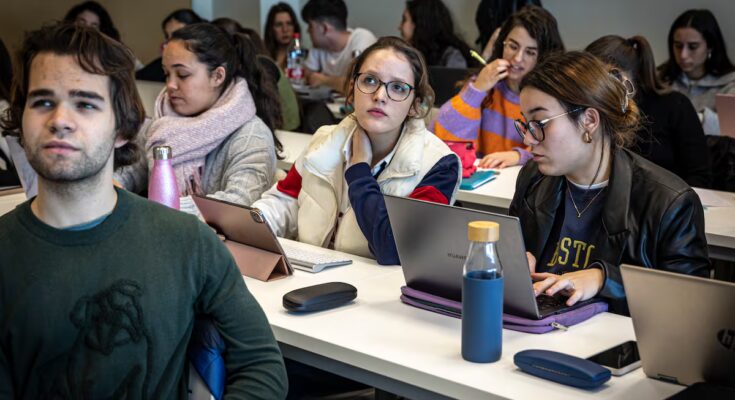The deans of the faculties of Education Sciences have planned major changes in the master’s degree in secondary school teaching, one of the most requested in Spain, where more than 40,000 students enroll every year and is essential to be able to teach in ESO, Baccalaureate and FP. These changes include the establishment of a master’s degree placement test that tests both academic knowledge and another set of skills important when teaching. Expand the practices and strengthen their control, to prevent them from continuing to be, especially in some centers, a procedure with almost no supervision. And, as already announced by this newspaper, extend the duration of studies from one to two years, so that there is time to delve into both educational issues and other skills related, for example, to classroom management and diversity.
The aim of the changes, university sources say, is to increase the demand for master’s degrees to improve the quality of the education system, and stop the flight represented by some private for-profit universities, which have become the main issuers of these degrees.
The assembly of the Conference of Principals of Education, where the vast majority of university officials in the sector are represented, will vote on the proposals in mid-November in Las Palmas de Gran Canaria. If they go ahead, which several sources at the institution believe is very likely, they will be transferred to the government, which is undergoing a reform of teachers. And the Executive, predictably, will take into account what the principals present when defining the training that teachers will have to have.
The master’s degree experienced a boom in recent years, which have especially benefited private universities offering degrees in this modality. onlinenot always of adequate quality, as the Government has also warned. Spanish secondary school teachers, however, are the least robust in the training they have received at university to carry out their work across the developed world, as revealed by the OECD TALIS study in October.
Between 2016 and 2024, the annual number of master’s graduates grew by 62%, reaching 30,327. The growth was concentrated above all in private companies, where it reached 128% (compared to an increase of 21% in public companies). Private universities went from 38% of graduates to 54% in eight years. And they represent almost the entire segment (93%) of the modality online of the master’s degree.
Similar to the old CAP
In some cases, a principal points out, there is not much difference between the difficulty posed by the master’s degree and that entailed by the old Certificate of Pedagogical Aptitude (CAP, replaced by the master’s degree in 2009 and known for its low requirements). Except for the economic cost: private companies ask for up to 8,000 euros for the title.
The principals propose that the new entrance test has general characteristics for all of Spain and is carried out in both public and private universities. Within the Conference of Deans of Public Education there are 85 university officials, most of whom come from public institutions, but also from various private non-profit institutions (foundations). The degree of agreement on the opportunity for implementation is broad, even if the document on which the principals will vote, which has the form of a white paper, does not go into much detail. The text outlines in broad terms what the title should be, leaving the specific definition for a later step, on which the Government will have to intervene.
Some ideas, however, are clear. Unlike the entry test for teaching careers also proposed by the principals, which would include a reading-writing test and another on logical-mathematical skills, in the case of the master’s degree the exercises would concern the specific discipline of the chosen master’s degree. That is, those who want to enroll in the Mathematics branch will take the exam in that subject, and the same will happen for those in Biology, Language, etc.
Both the entrance test for qualifications for teachers and for master’s degrees for secondary school teachers would instead include a filter on “non-academic characteristics”, but of a socio-emotional and motivational nature, which would allow evaluating which candidates have the most suitable characteristics to be teachers. A type of assessment that exists in several European countries and, in Spain, in the University of the Balearic Islands to access teaching.
Strict rules
The principals start from the idea that the tests would be carried out by the universities themselves, applying common standards that are sufficiently rigid so that there are no academic institutions that lower the required level to the point of making the test useless.
Entrance exams would likely reduce demand for master’s degrees and teaching. But this does not worry the faculties of Education Sciences, which have many more requests than places. In Andalusia alone, around 20,000 candidates fail to access public universities every year. The number of graduates, however, almost triples the needs of the teacher training system every year, calculated by 2022 by the Ministry of Education. The shortage of teachers in some specialties, such as Mathematics, Computer Science or some specialties of professional training, has a different origin (above all, the strong attraction that thriving economic sectors have on graduates in these disciplines), and requires specific measures.
Greater control over the internship period
The principals also propose to strengthen the practical part of the secondary school master’s courses. To this end, they propose that the educational centers where the students will carry out internships should first obtain an accreditation that guarantees their quality. Today, especially in some private schools, students can resolve this phase of their learning by having their placements signed off at an education center, without much supervision from the university, sources at the Principals’ Conference say.
The White Paper that they will vote on at the Las Palmas meeting also proposes to strengthen collaboration between universities and secondary schools, train internship tutors, tend to professionalize master’s teachers, and make initial training (what teachers receive at university) and ongoing training (what they do once they enter work) more coherent.



